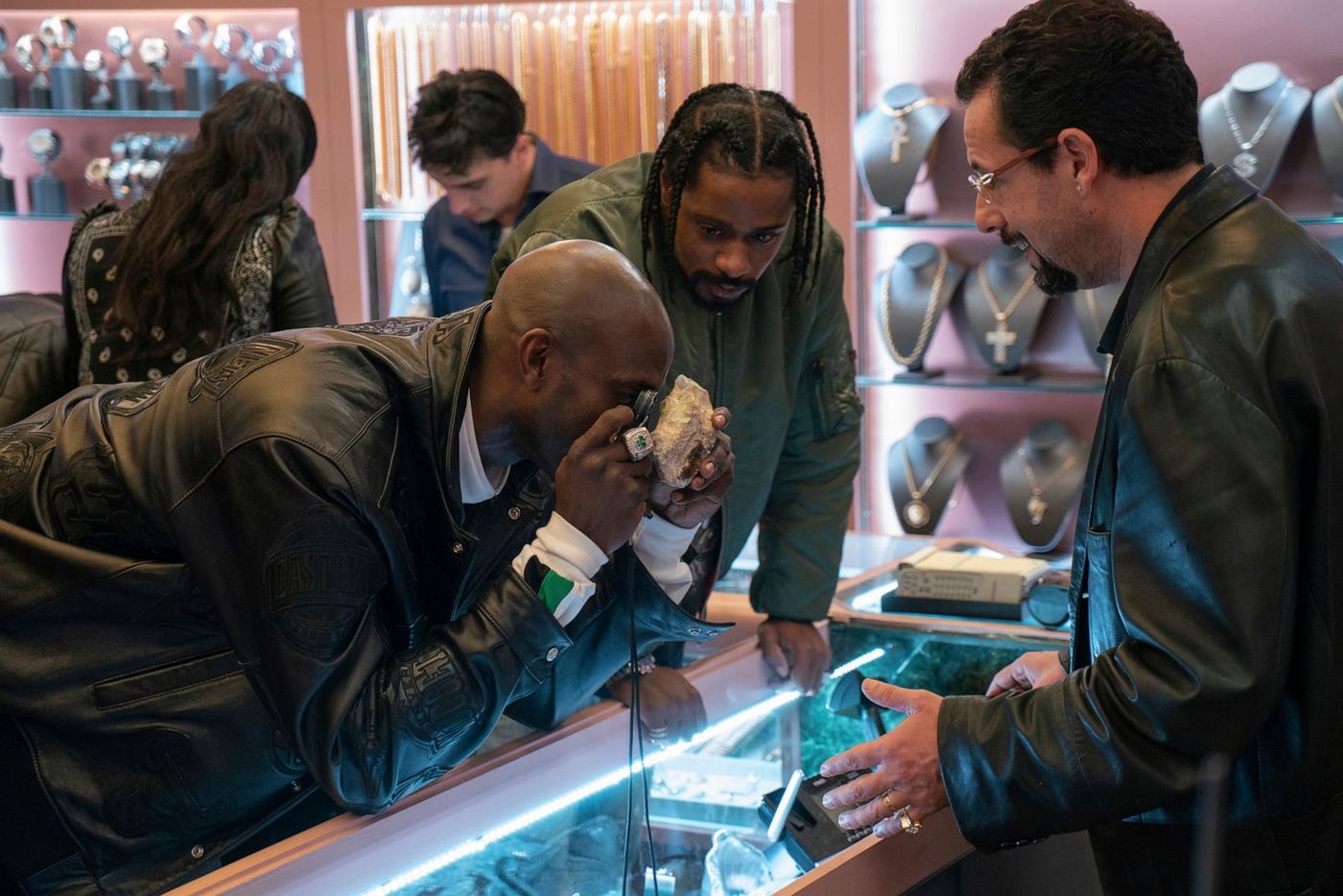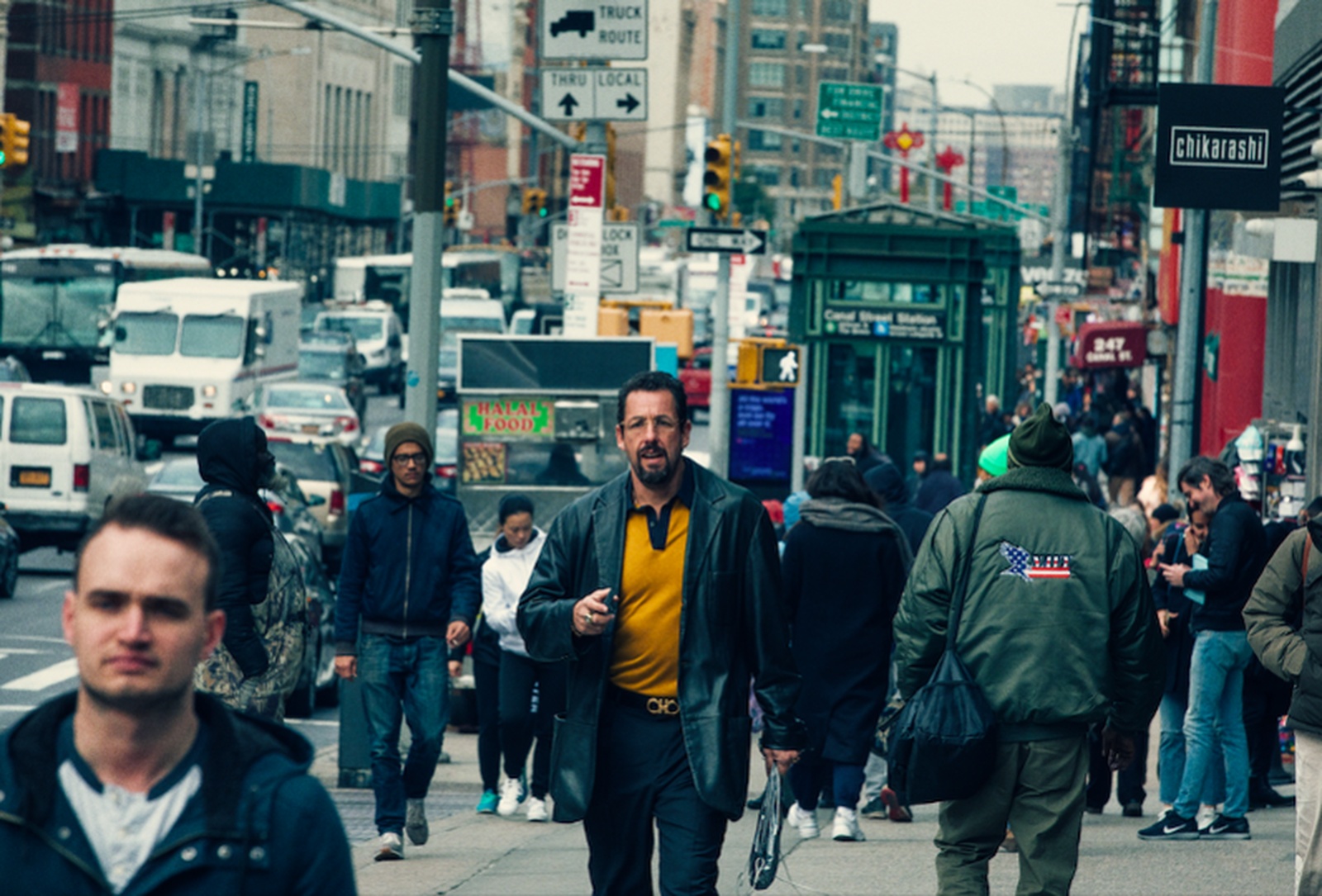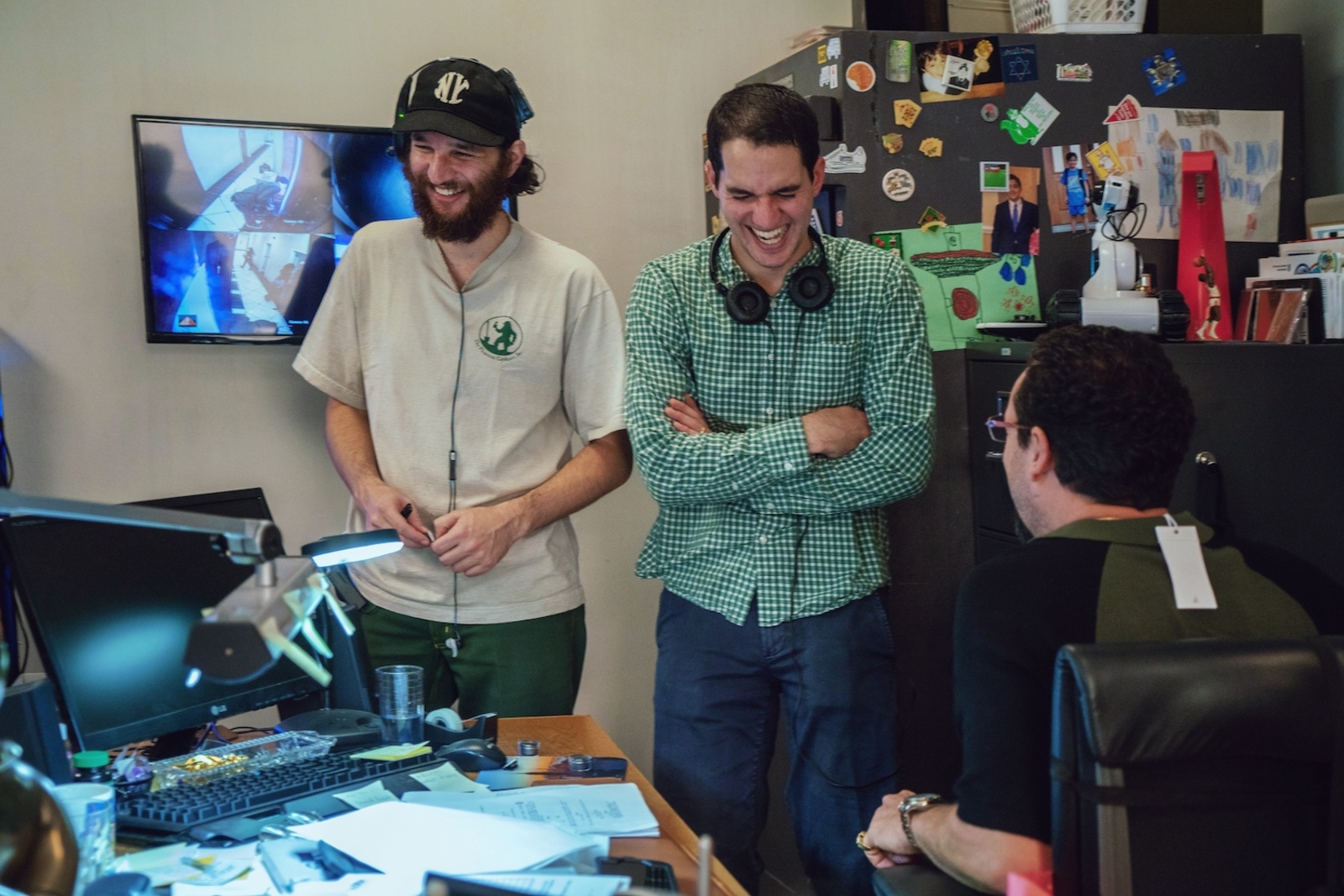The films of Josh and Benny Safdie are no doubt anxiety-inducing, but if one looks closer within the chaos of their newest thriller Uncut Gems, a world of comedy is hiding underneath. Adam Sandler plays Howard Ratner, a jeweler in the Diamond District of midtown Manhattan who comes in possession of a black opal from Welo opal mines in northern Ethiopia that catches the eye of NBA star Kevin Garnett. Ratner loans the opal to Garnett for good luck in exchange for a championship ring. Already in trouble with other people’s money, Ratner makes a successful bet using Garnett’s ring as collateral. When Garnett refuses to return the opal, Ratner has to call on every last favor he’s owed to keep his head above water–and it gets pretty bad for the jeweler.
Cinematographer Darius Khondji bookends the film with deep zooms; the first is a benign look at the black opal. The second, while similar in approach, encroaches on a ghastly wound that is shockingly funny when you consider everything that led up to it. Uncut Gems is a comedy, but it’s trappings are deceptive until you dig for the humor.
With A24 opening the film in theaters following a fall festival run, we spoke with the Safdie brothers about building the story around Kevin Garnett’s career and tinkering with his reputation. We also talked about the “emotional tornado” of the shoot with cinematographer Darius Khondji, Martin Scorsese’s Marvel controversy, and the taboo Jewish tropes they used to create Howard Ratner.
The Film Stage: Howard Ratner [Adam Sandler] says you can see the universe in the black opal. What universe is he seeing? Because I don’t think he’s living in the same word as other people.
Benny Safdie: You’re right, because Howard actually can’t see what Kevin Garnett sees in the gem. We were just talking about that…
Josh Safdie: Gamblers, in general, have the most insane, almost nauseatingly optimistic point of view. So the universe he sees is one that’s filled with impossible possibilities. Where you can see, “Oh, mankind is actually a brother of a dinosaur,” to Howard anyway. He’s like, “We’re all the same.” That’s what’s so beautiful about it.
Benny: It is a totally different universe, and how do you show that? It isn’t shown with the collage of colors that everybody else sees. He sees it in a totally different kind of way.
It’s funny you say Howard thinks in terms of brotherly love because at the end of the movie he thinks these gangsters he’s scammed will be cool with him taking yet another bet with their money.
Josh: In his mind, he thinks the greatest victory is when you can overcome. He’s like, “If we can overcome together then what’s there to be upset about?”
Benny: He does have that view of “Everybody’s just going to get along, if they just see!”
Did you build the movie around Kevin Garnett or did he sign on later?
Benny: It’s tricky. It started out with a different player in 2010 and then we tried to cast it up with Kobe Bryant. Whenever you change the casting decision of the basketball player, you basically end up changing the entire movie. We do that with every casting decision. It doesn’t matter if this person has one line or a hundred lines; we try to rewrite the character to fit the casting decision. With the basketball player it was really complicated because we had these specific games we had to write around. The player has their own personality and motivation.
It changes the time period, too.
Benny: Exactly. Every time. It’s a bit of a window into the obsessive writing process that we go through. It’s funny because it was built around each basketball player every time the script changed. So it’s insane.

One constant had to be the Diamond District. Even though the movie is set in 2012, the culture on that block doesn’t really change.
Josh: I’ll tell you what’s changed: the trends. The bling culture today is a little more exuberant than it was in 2012. It’s kind of become more mainstream because of rappers like Migos and Lil Uzi Vert. They flaunt their bling, and when I say bling I’m talking about Elliot Eliantte, who was one of the jewelers we researched with. He did the Migos chain that’s interactive. On the chain there’s a bow where a guy comes out with an AK-47. In 2012 that kind of thing was more outsider, but bling culture has been around since the 1980s.
Benny: But that block never changes. It’s its own world and it’s a time capsule in a sense that your word is your bond, people buy things with cash, and these old-world ideas stay the same no matter how things around them change. It’s been amazing to see it’s stayed the same over the last ten years.
What was it like for Kevin Garnett to present himself as obsessed with this gem? To play with his reputation?
Benny: We were talking with him about how do you become enamored with something that doesn’t talk back to you? He could really relate to the idea of being so superstitious about something and needing it to play well. He channeled all of that passion he normally has in his life into this rock. He had repetitions and things that he did when he played. Also his past, we asked him to think about his life and he was using it almost as this silent therapist, so he was really interacting with it. In general, his approach to acting was amazing because he knew he had to take it to a level of this isn’t just a cameo, it’s a real role and I have to prepare for it. He came totally prepared. It was weird. He’s so imposing on the basketball court with such passion, but he came in wanting to learn how to do something new.
Josh: With first-time actors you do this thing where you pretend that it’s just a few days, like the project is no big deal. We sent him the script and this document that details everything that was going on in his life in-between the scenes he shows up in the script. He doesn’t have to imagine what’s happening, this is what you do as a director. You sit down and tell an actor what’s happening between last time and this time. We just wrote that out for him. If we wanted to, he could’ve seen himself as the lead actor because that’s the version he read. You develop a friendship and the friendship allows you to start talking. He started telling us really intimate stories about his youth. You obviously don’t use those stories in the script, but you’re using them in getting deep with trust for each other. You’re also using that sometimes to get them to access certain scenes. That’s where directing almost becomes psychoanalytical. It becomes deep. It becomes a great vessel to become friends with someone.
Benny: We’re also trying setting up an environment where it’s okay to make a mistake. So the pressure of, “Oh, I’m acting with all these great actors” isn’t really there because you can mess up and it’s okay, we’ll fold it in and work it out.
What was it like having Darius Khondji shoot Uncut Gems?
Josh: Darius is a poetic zen-center who thinks about exposure in the way poets use words.
Benny: He’s a necromancer. The way he recreates daylight as a living thing is one of the most incredible things to see. He spends so much time on it and then he holds his hand out in the daylight he created.
Josh: Darius and I had these headsets because I never left the set and he would be near the monitor. It’s an open line between me, him, and the camera operator. I had the pleasure of constantly hearing Darius’s live emotional reactions to every take. More than anything with this movie, he was so invested in the emotions and humor, he was laughing the entire movie. He was this emotional barometer. English is his second language and you could tell if it was hitting him, it was really working.
Benny: He said he has a hard time remembering anything from the movie because it was like an emotional tornado.

The most popular movies this year are about stones: Avengers: Endgame, Parasite, and Uncut Gems.
Josh: I love that because in a weird way, the further we get into the future on Instagram and social media, stuff that isn’t physical–even physical money–becomes less and less valuable. All of a sudden you remember we are on this fucking big-ass rock. We’re all part of the same story ultimately. It’s kind of cool to see a weird sub-trend in movies. We’ve gotten to know director Bong Joon Ho a bit this year and when he saw our movie at Telluride he was like, “We both made movies about these fucked-up rocks!”
I don’t necessarily want your opinion on superhero movies, but what did you think about the controversy surrounding Martin Scorsese’s thoughts on Marvel movies?
Josh: [Laughs.] What did I think about it? Scorsese has the right to say whatever the hell he wants to say. I think the piece he wrote for The New York Times was so moving and so touching, it was almost like the mic drop. It was beyond the conversation about superhero movies. Those movies, whether you like it or not, have become our Shakespeare. Who’s going to play Macbeth next? Who’s going to play Joker next? There’s good versions of it, there’s bad versions of it. There’s entertainment, there’s people who are trying to subvert the entertainment. I think Marty used his piece as an incredible vessel to talk about the powers of movies, but he’s not wrong to say that ultimately you can make an independent film that cost $200 million dollars. That exists. Those movies aren’t predicated on pre-existing entities. There’s fewer checks and balances is what he’s saying. There’s more of an opportunity for him to get into the independent ethos. There’s ways to slip in expression, too. When the controversy was going on I was thinking, “I don’t watch many of those movies.” I’ve seen a handful and a couple of those I’ve seen I liked. Scorsese has a point of view on it. He and his peers paved the way and they’re looking at multiplex movies from a different point of view.
How was Scorsese involved as your executive producer?
Benny: He raised the profile of our movie. The one thing I saw in that controversy was people asking, “What has Scorsese done for cinema?” The thing that’s incredible about Scorsese, he’s done so much for movies. [Laughs.]
“Why doesn’t he create a film foundation?!” Well…
Benny: He’s saving so many movies!
Josh: Beyond his own films, which are evergreen for cultures for decades to come, he’s immortalized himself. He’s also preserved some of the rarest films ever through his World Cinema Project. On top of that, he’s had a tradition since the early 1990s of supporting young filmmakers and helping them.
Benny: He saw Heaven Knows What, which is such a small movie. We wouldn’t think it would reach him.
Josh: And the way he responded to it with such seriousness and respect for the work. He saw the romance of it. It was like a real Hollywood melodrama in a weird way. I saw him do a hosted conversation for the Josh Oppenheimer movie The Look of Silence. He takes everything so seriously. He had index cards of questions he wanted to ask. He’s an indentured servant to cinema forever.
Benny: With our movie it was a ten-year project. He got involved in year four. He saw Heaven Knows What and attached himself to this project at a time when this project needed a boost more than anything. What he did was lift the profile of the film exponentially. He attached financiers so suddenly there was money, regardless of casting. He saw this little film we made and he believed in us. He and his producer Emma Tillinger Koskoff, who also producer Joker, she was reading the scripts and said Marty will read a draft of your script and he’ll watch the first cut of your movie. They were very helpful in putting together a crew for our film.
Actually, I think our key grip worked on After Hours and he almost killed Griffin Dunne. Remember the shot when the keys get thrown out of the apartment? That was a pulley system and the camera was on a rope. He had to let go of the rope and he had to stop it by hand. It was not working so he had to grab it at the last second. The notification mechanism wouldn’t work so he did it and no one said anything. Griffin Dunne didn’t say, “Stop! It’s about to hit me!” That’s why that shot is so amazing because it was literally about to hit him in the face. But that guy Charlie Marroquin worked on our movie!
Josh: Emma told us he’d be involved in the edit, but we coincided with The Irishman so he couldn’t. I went on set for The Irishman.
Do you remember what scene it was?
Josh: I was on set when Frank killed Joe Gallo. It was crazy. They recreated Little Italy a few blocks away from Mulberry Street.

Howard is like a character made up on Cum Town. He could be a character on that podcast or something created by Nazi propaganda.
[Both laugh.]
It seems like you’re fucking with the audience, daring people to recognize the taboos he’s based on.
Josh: It’s funny because one of the inspirations for the character was this guy Al Goldstein. He was a First Amendment pioneer through his publication Screw Magazine. He has this incredible, late-night public access show called Midnight Blue. In Screw Magazine he would have pornography that he got in trouble for, but he also would have these incredible op-eds. He would have amazing cartoonists draw for him. He has these great writers come up with a fake interview between Goldstein and the Nazi Albert Speer. Goldstein greatest pull-quote ever, it’s actually in the zine we did with A24, Speer says…
Benny: Before that, Howard wears all that on his sleeve proudly. He’s basically saying, “Say it! It’s not going to affect me! I’m living it and I’m loving it!” It’s like a power.
Josh: This is a page in the zine [Josh shows a two-page spread of prominent Jewish entertainers] titled New York Jew.
Is that Rodney Dangerfield?
Benny: Rodney was one of the biggest inspirations! The movie Easy Money, his whole comedy routine of “no respect”–Howard gets no respect.
Josh: There’s Rodney Dangerfield, Sandy Koufax, James Caan, Al Goldstein, Norman Mailer, Howard Stern, Gene Simmons, Meyer Lansky the great Jewish mobster, Red Holzman, Jerry Lewis, Harvey Kurtzman legend of MAD Magazine, and Robert Moses.
The Goldstein quote is: “I am probably the epitome of everything the Nazis hated. The Jewish pornographer who besmirches the pure morals of the white Aryan world. Hitler would have thought of me as the devil incarnate.” Speers asks, “So why did you consent to talk to me?” “Just exactly for that reason,” said Goldstein. “Because you are the ultimate product of Germany’s defeat.”
[Both laugh.]
Uncut Gems is now in limited release and expands on December 25.
